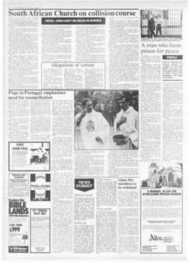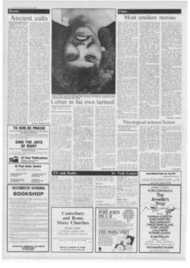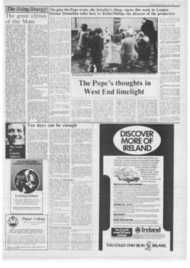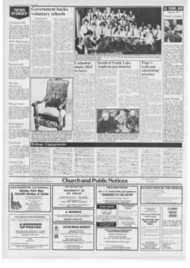Page 5, 21st May 1982
Page 5

Report an error
Noticed an error on this page?If you've noticed an error in this article please click here to report it.
Tags
Share
Related articles
Celebrate The Birthday Of The Church Of Christ
Sharing The First Christians' Faith
Wisdom Against A Violent World
The Searing Challenge Of Christ's Call To Give Up Worldly...
Scripture Notebook
Conrad Pepler O.P. Seventh Sunday of Easter
Apostles waiting for the Spirit
Acts c1 vv15-26; 1 John c4 vv11-16; John c17 vv11-19
THE READINGS today are concerned with the Apostles, at first, as would be expected, after the Ascension they wait for the coming of the Spirit: the first letter of St John continues from last Sunday the theme of love that he had learned as the disciple whom Jesus loved; and finally Jesus himself prays for his apostles in his final "priestly prayer" after the Last Supper. The apostles with Our Lady and other men and women disciples had returned to the upper room in Jerusalem after Jesus had been "lifted up" anddisappeared. Strangely they had come back "with great joy". Their faith was hourly being purified and strengthened. Visions of restoring the Kingdom to Israel had waned. and the two angels had assured them that Jesus was to return as they had seen him depart. But the sense of the fulfilment of the history of Israel remained: the twelve were to be successors to the twelve tribes. They were evidently conscious at the time that there were only eleven of them, even though the total assembly there was about 120 persons — the upper room must have been larger than we generally imagine. Peter indicates the empty place, giving the gruesome details of Judas's death (omitted in today's reading): and they decide to make up the number again to 12 by casting lots for Matthias or Barsabbas. That is the only' time we hear of Matthias. It was surely an official arrangement for the structure of the new church which was about to enter into the heritage of the 12 tribes. Had they been able to wait for a year or two they would have found in Paul someone far more than a substitute for Judas. But Paul would not have fulfilled the conditionc which Peter_now lays down for an 'official' apostle.
The apostle had to be one who provided continuity with the old Israel: he must have walked with Jesus since the days of John the Baptist. "For all the prophets and the law prophesied until John," Jesus said of the last great figure of the Old Testament as he inaugurated the New. Not only must the official apostle provide a link with the past, he must also be a witness to the fulfilment of the New in the Resurrection. and be with the others at its completion, for which they were waiting. without however a clear idea of what that was to be. In a sense this was the mechanics of maintaining the 'College of Apostles'. Supporting this official choice of No. 12 was the continual background of prayer with the motherly devotion of our Lady at its centre. She had no 'official position, such as Peter had, but there can be no doubt of her position among all those who "with one accord devoted themselves to prayer" during those ten days. John in particular would have uppermost in his memory Jesus's last words to him. "Behold your mother".
It is John, in the second reading, who shows that the qualifications of an apostle are not to be restricted to any form of "official" interpretation. "We
have seen and testify that the Father has sent his Son as the Saviour of the world." John had 'seen' the Son since the time of the Baptist and he had witnessed and 'testified' to the Resurrection and all that followed after. All is summed up in the depths of the Joannine message: "If we love one another, God abides in us and his love is perfected in us". The prayer together in the upper room was the activity of this love, manifesting clearly that the Son was in their midst with the Father waiting for the fulfilment in the Spirit. "By this we know that we abide in God and he in us," John is of course, writing after Pentecost, "because he has given us his own Spirit".
As we turn to our Lord's prayer for his apostles (third reading) we t emember that Judas had just left 'the college' for good, • and that John had been leaning close to Jesus and listening to his quiet words. Judas had gone out into the darkness of the world: Jesus is to leave the world also, but for the glorious light of union in the Father. The apostles will not be leaving the world and need therefore the continued strength which Jesus had given them, keeping them in' the Father's name making them one with Father and Son. In order not to be overcome by the world the apostle needs the ultimate strength of this love and of the truth. "Sanctify them in truth ... that they may be also consecrated in truth". These are indeed words of strength. The apostle cannot be an apostle unless. as it were, sealed by the truth of God's word. The history of Christendom shows how frequently the one who has been sent, the apostle, has fallen from this consecration and been drawn in a vvorld of untruth. But the true apostle will draw many others into this truth and this
ltie. and for these too our–Lord prays.
These readings are appropriate for Christians of this country as they spend the last few days of final preparation for the Holy Father's visit. The purpose of the visit, as so often emphasised, is a pastoral one — to revivify Christians in these fundamental qualities of the apospe. We are to talcs up again the momentum of the tNational Pastoral Congress which stood out as a manifestation of the Spirit. That Spirit revealed a new consecration in love and in truth. It is by no accident that the Holy Father comes here for Pentecost. So we should prepare in love and truth. The Easter Sacraments of Baptism. Eucharist and now Confirmation impose on the Christians of this country the same conditions as revealed in these readings. But the approach of the Papal visit as well as the publication of Arcic final Report, the whole purpose of which is to draw the churches together in truth and in love, seem to threaten the appearance of 'camps' among the Christians. If this were to happen it would be a tragedy running directly counter not only: to the intentions of the Pope and of Arcic. but also to the foundations of the Christian mission set before us in these readings.
blog comments powered by Disqus











